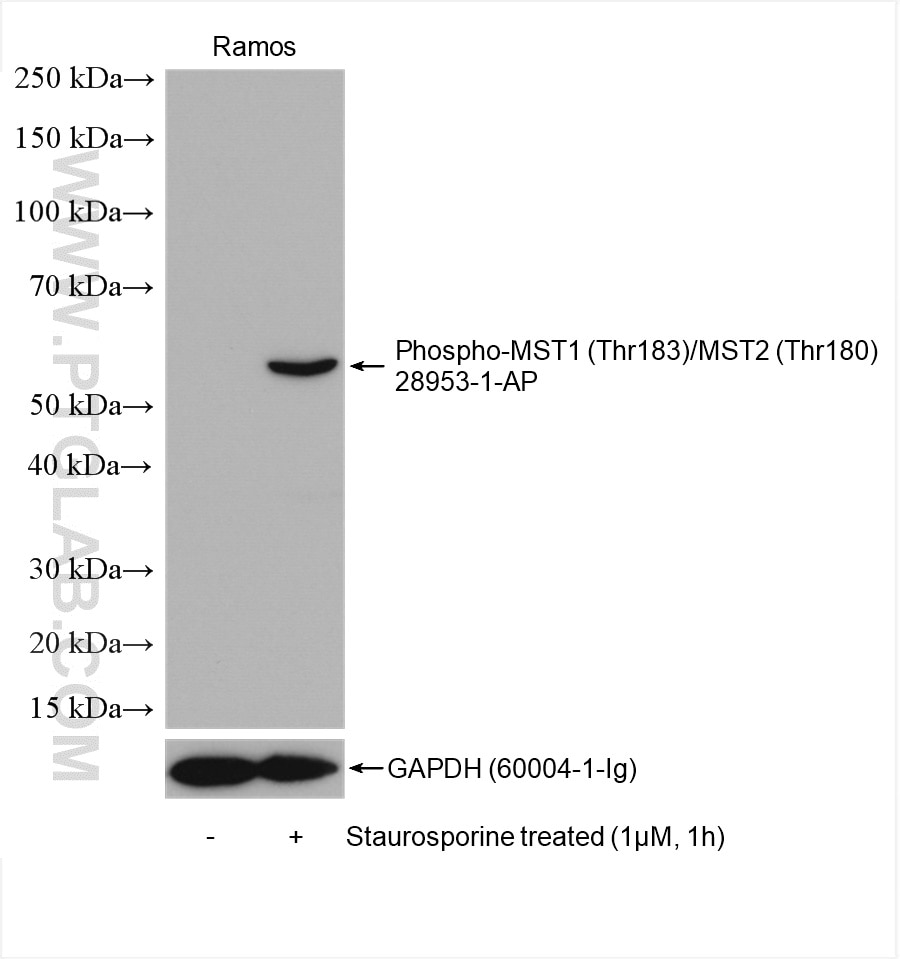Phospho-MST1 (Thr183)/MST2 (Thr180) Polyklonaler Antikörper
Phospho-MST1 (Thr183)/MST2 (Thr180) Polyklonal Antikörper für WB, ELISA
Wirt / Isotyp
Kaninchen / IgG
Getestete Reaktivität
human und mehr (2)
Anwendung
WB, ELISA
Konjugation
Unkonjugiert
Kat-Nr. : 28953-1-AP
Synonyme
Geprüfte Anwendungen
| Erfolgreiche Detektion in WB | mit Staurosporin behandelte Ramos-Zellen |
Empfohlene Verdünnung
| Anwendung | Verdünnung |
|---|---|
| Western Blot (WB) | WB : 1:500-1:2000 |
| It is recommended that this reagent should be titrated in each testing system to obtain optimal results. | |
| Sample-dependent, check data in validation data gallery | |
Veröffentlichte Anwendungen
| WB | See 7 publications below |
Produktinformation
28953-1-AP bindet in WB, ELISA Phospho-MST1 (Thr183)/MST2 (Thr180) und zeigt Reaktivität mit human
| Getestete Reaktivität | human |
| In Publikationen genannte Reaktivität | human, Maus, Ratte |
| Wirt / Isotyp | Kaninchen / IgG |
| Klonalität | Polyklonal |
| Typ | Antikörper |
| Immunogen | Peptid |
| Vollständiger Name | serine/threonine kinase 4 |
| Berechnetes Molekulargewicht | 56 kDa |
| Beobachtetes Molekulargewicht | 52-56 kDa |
| GenBank-Zugangsnummer | BC005231 |
| Gene symbol | MST1 |
| Gene ID (NCBI) | 6789 |
| Konjugation | Unkonjugiert |
| Form | Liquid |
| Reinigungsmethode | Antigen-Affinitätsreinigung |
| Lagerungspuffer | PBS with 0.02% sodium azide and 50% glycerol |
| Lagerungsbedingungen | Bei -20°C lagern. Nach dem Versand ein Jahr lang stabil Aliquotieren ist bei -20oC Lagerung nicht notwendig. 20ul Größen enthalten 0,1% BSA. |
Hintergrundinformationen
Mammalian STE20-like serine-threonine kinase MST1, encoded by the STK4 gene, is a multifunctional protein. MST1 and its closest paralogs MST2 (encoded by the STK3 gene), MST3, and MST4 are members of the Class II Germinal Center Family of Protein Kinases. MST1/2 and LATS1/2 (large tumor suppressor 1 and 2) are core kinase components of the Hippo tumor suppressor pathway in mammalians . In the conventional Hippo pathway, the MST1/2 and LATS1/2 signaling cascade phosphorylates and inactivates the transcriptional coactivator YAP1 (yes associated protein 1) and its close paralog WWTR1]. YAP1 and WWTR1 do not have DNA binding domains and they exert their biological outputs, such as cell proliferation and survival, by interacting with the TEAD1-4 transcription factors. Lines of evidence have indicated that dysregulation or loss of STK4/Hippo signaling is linked to developmental disorders and carcinogenesis with poor prognosis. MST1 is a stress-induced kinase and it can be activated in response to cell-death inducers. Autophosphorylation of MST1 at Thr183 (Thr180 in MST2) in the activation loop is a key activation mechanism for MST1/2 because phosphorylation of Thr183/180 causes the cleavage of MST1 by caspases under apoptotic conditions.
Protokolle
| PRODUKTSPEZIFISCHE PROTOKOLLE | |
|---|---|
| WB protocol for Phospho-MST1 (Thr183)/MST2 (Thr180) antibody 28953-1-AP | Protokoll herunterladen |
| STANDARD-PROTOKOLLE | |
|---|---|
| Klicken Sie hier, um unsere Standardprotokolle anzuzeigen |
Publikationen
| Species | Application | Title |
|---|---|---|
Int J Biol Sci S100 Calcium Binding Protein A16 Promotes Cell Proliferation by triggering LATS1 ubiquitin degradation mediated by CUL4A ligase to inhibit Hippo pathway in Glioma development | ||
Cell Rep The STRIPAK complex is required for radial sorting and laminin receptor expression in Schwann cells | ||
bioRxiv The STRIPAK complex is required for radial sorting and laminin receptor expression in Schwann cells | ||
Discov Oncol Upregulated GPRC5A disrupting the Hippo pathway promotes the proliferation and migration of pancreatic cancer cells via the cAMP-CREB axis | ||
Cell Death Dis PLAGL2 promotes bladder cancer progression via RACGAP1/RhoA GTPase/YAP1 signaling | ||
J Cell Physiol m6 A-induced TRIB3 regulates Hippo pathway through interacting with LATS1 to promote the progression of lung adenocarcinoma |


